Malabo, Equatorial Guinea – Tuesday, 15 July 2025 -The Africa Prosperity Dialogues (APD) 2026 was officially launched at the Malabo Leadership Breakfast Meeting, bringing together over 500 of Africa’s most influential political and business leaders on the sidelines of the African Union’s 7th Mid-Year Coordination Meeting. The historic gathering, held under the theme “Financing and Facilitating the Movement of People, Goods and Services Across Africa”, marked a pivotal moment in the continent’s journey towards economic integration and shared prosperity.
High-Level Attendance
The launch event was graced by an exceptional assembly of continental leadership, including His Excellency President Teodoro Obiang Nguema Mbasogo of Equatorial Guinea, His Excellency Brice Clotaire Oligui Nguema, President of Gabon, His Excellency Mohamed Yunus al-Menfi, Head of State of the State of Libya, and His Excellency Mahmoud Ali Youssouf, Chairperson of the African Union Commission, as well as H.E. Selma Malika Haddadi, Deputy Chairperson of the African Union Commission. The gathering also featured Madam Dr Nkosazana Dlamini-Zuma, Advisory Council Chairperson of the Africa Prosperity Network, alongside ministers of state, heads of regional economic blocs, development finance institutions, and Africa’s leading business executives.
The meeting, organised by the Africa Prosperity Network (APN) and Invest Equatorial Guinea, in collaboration with the African Continental Free Trade Area (AfCFTA) Secretariat, demonstrated the powerful synergy between public and private sector initiatives in driving continental integration.
Key Addresses and Vision
President Teodoro Obiang Nguema Mbasogo – Host President
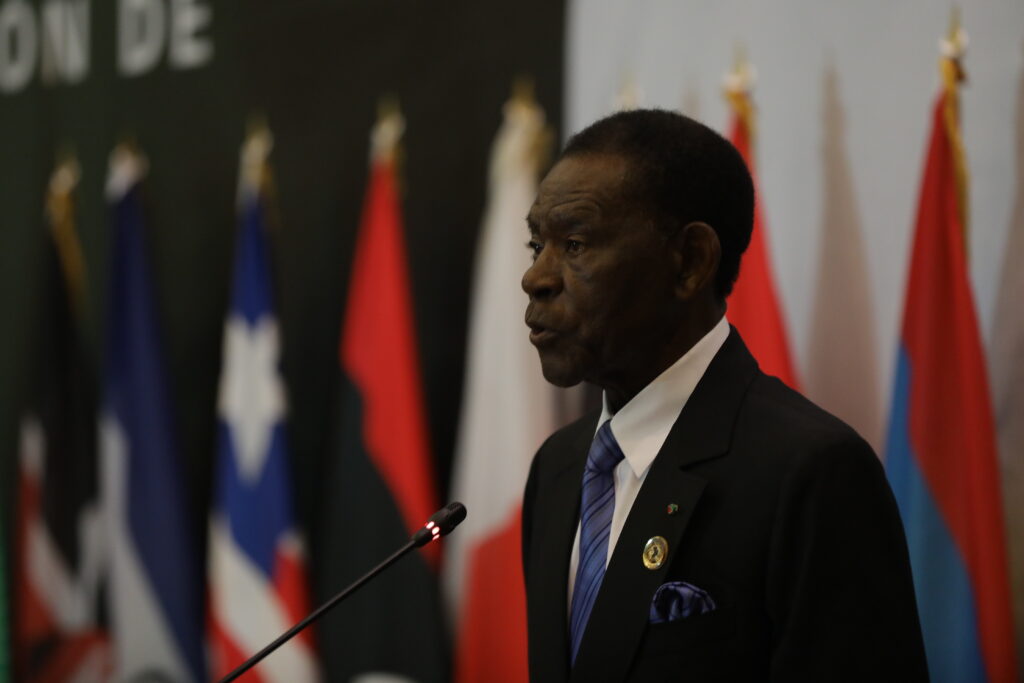
Opening the breakfast meeting, President Obiang welcomed delegates to Malabo, emphasising the historic significance of the moment. “We are deeply pleased to welcome you to this city where African history is projected with hope towards the future. This morning of leadership is an opportunity to listen, coordinate and advance with a common vision towards the integration of the land of the African continent,” he declared.
The President articulated three profound convictions driving Equatorial Guinea’s commitment to continental integration: “First, we believe in an Africa where integration is not limited to treaties but is reflected in the everyday life of our peoples, where Africans can move without obstacles, enriching the economic, social and cultural fabric of the continent.”
He strongly endorsed the proposed innovative $1-a-day fund initiative, stating: “We support initiatives such as the $1 a day fund for its innovation and symbolism that shows that Africa can finance its development without mobilising its inhabitants with common objectives and transparent mechanisms.”
Highlighting Equatorial Guinea’s progressive immigration policy, President Obiang noted: “Our country receives all immigrants as long as they have an identity. We receive immigrants from West Africa without any problem… Therefore, we believe that free movement is necessary to end the shame that African immigrants suffer when they leave for other continents.”
H.E. Mahmoud Ali Youssouf – AU Commission Chairperson
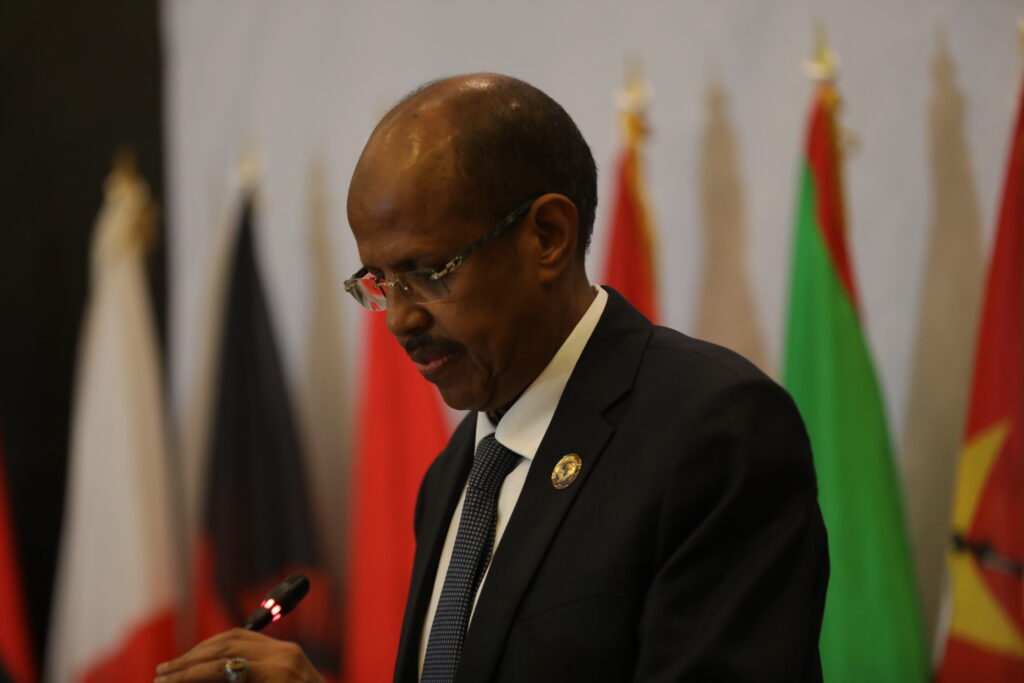
gratitude to the Africa Prosperity Network and Invest Equatorial Guinea for putting together such an important meeting ahead of the 7th AU Mid-Year Coordination Meeting and highlighted the challenging global environment, noting that protectionist measures have created “the greatest rupture of the international trade order since the end of the Second World War.” He outlined the consequences for Africa: “The internet has lowered its economic growth forecast from 4.2% to 3.8% for the year 2025. These measures are likely to cause the volatility of the prices of raw materials, increase the costs of employment and limit access to financing on the international financial market.”
Referencing the continental vision, he stated: “We had the ambition, Madam Zuma, by deciding that for 2063, Africa must be a developed continent. And for this, we had to create the conditions for an economic growth of 7% every year over 50 years. Unfortunately, we have achieved only 4%. During the period of 2013-2023, we were behind. To compensate for this delay, we will now need a growth rate of 8% per year over the period of 2024-2063.”
The Chairperson outlined six critical corridors for regional integration, including the East Africa corridor, the West Africa corridor, the Central Africa corridor, the North-South Africa corridor, the Trans-Saharan Africa corridor and the Maritime corridor, a newly proposed plan to connect island states to the continent.
H.E. Ali Youssouf also outlined 5 Sectoral Infrastructure Priorities:
- Transport Infrastructure: “The means of commuting, such as roads, railways and sea routes. These are the relevant pillars of African trade. I emphasise the urgent realisation of the African network of high-speed trains.”
- Energy Infrastructure: “Access to reliable, competitive, sustainable and vital energy to support our industries and trade exchanges,” with a comprehensive energy classification including electricity, nuclear, gas, solar, coal, fuel, wind, and geothermal sources.
- Digital Infrastructure: “Our continent must not remain on the verge of the digital revolution at this age of artificial intelligence.”
- Aviation Infrastructure: Emphasising “the importance of making the unique market of maritime air transport effective” through the Single African Air Transport Market (SAATM).
- Financial Infrastructure: Highlighting the Pan-African Payment and Settlement System (PAPSS) and the need for enhanced capitalisation of development banks.
Madam Dr Nkosazana Dlamini-Zuma – Advisory Council Chairperson, Africa Prosperity Network
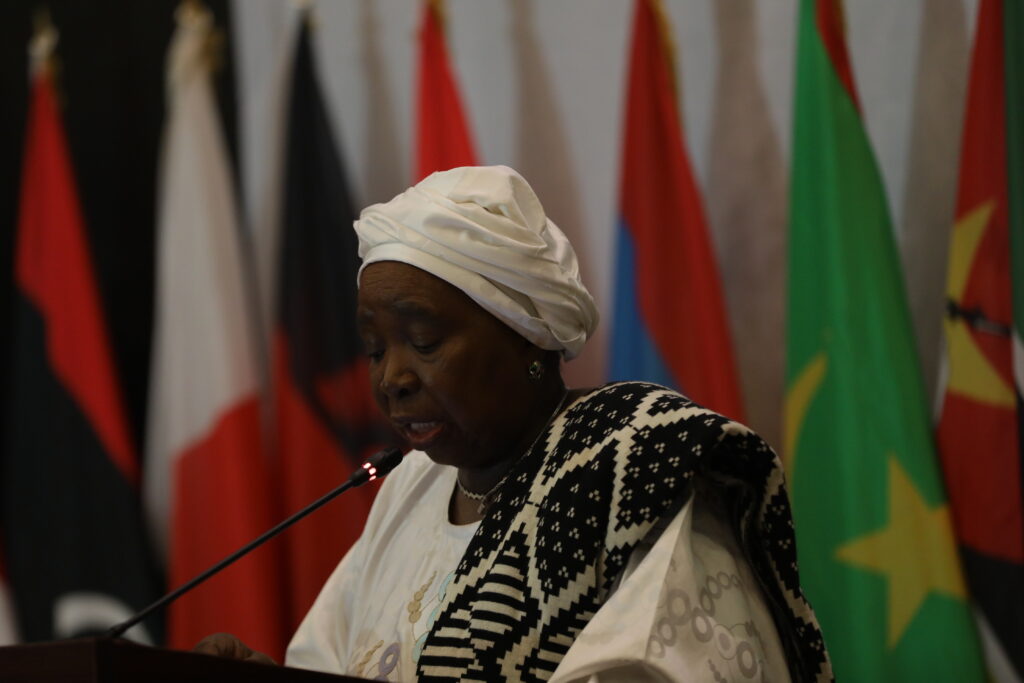
Madam Dr Nkosazana Dlamini-Zuma delivered a passionate address on the transformative potential of Africa’s demographic dividend, particularly focusing on the continent’s youth and women. She highlighted critical statistics: “Africa’s future and prosperity can only be built or achieved by the Africans themselves. We are almost 1.4 billion strong, plus the diaspora, which is about 130 million plus. And together, we can build the Africa we want.”
Using the example of a Ghanaian shea butter producer, she illustrated the market expansion potential: “Let’s take a woman in Ghana producing shea butter. If she starts thinking African, and the African continent has been changed, her market changes from 35 million plus to 1.4 billion people.”
Kwaku Sakyi-Addo, Board Member & Executive Director, Africa Prosperity Network
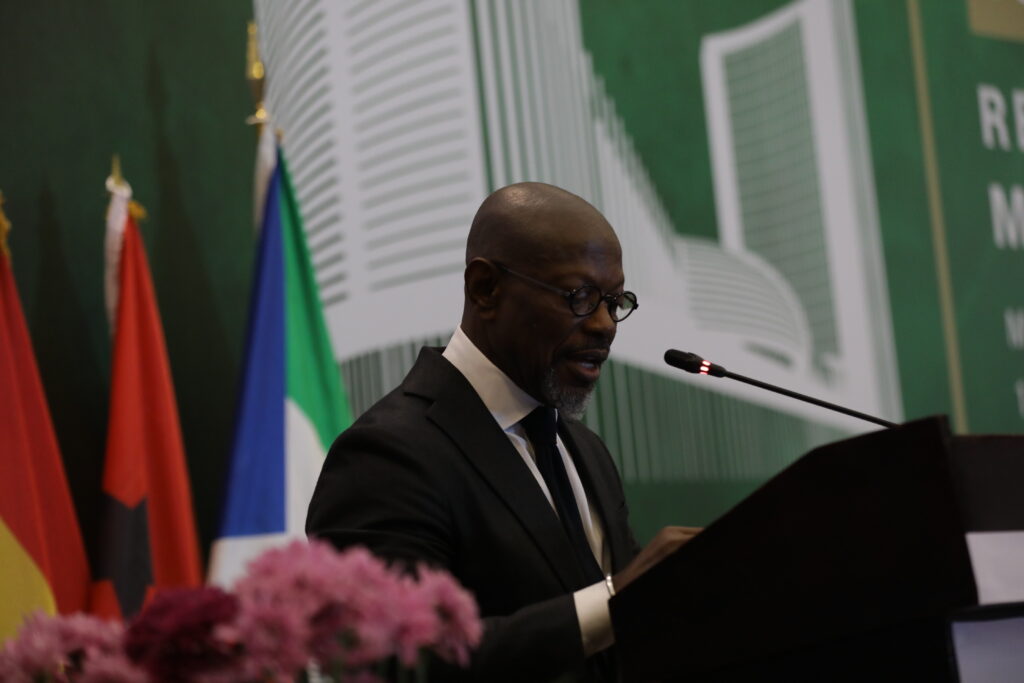
The official launch statement for APD 2026 was delivered on behalf of the Executive Chairman & Founder, Mr Gabby Asare Otchere-Darko, by Board Member & Executive Director, Mr Kwaku Sakyi-Addo, with remarkable clarity on the event’s transformative objectives. “What has been clear from this morning’s rich discussions on trade agreements, protocols, ease of travel and movements of goods and services is that it has affirmed a simple truth: Africa’s single market will only succeed if it becomes a market that allows the hundreds of millions of Africans involved in small and medium scale enterprises, our women, and our young people to effectively own and drive it.”
The statement outlined ambitious targets: “If we achieve this, the ripple effects will be transformative. It can easily lead to 50 million jobs created by 2030, 30 million Africans lifted from poverty, and a single market that is truly inclusive, one that leaves no one behind.”
Innovative Financing Mechanisms
Eric Otoo presented the proposed innovative funding mechanism central to the APD vision, highlighting three key pillars driving optimism: the growing African middle class of 400-500 million people, the diaspora’s $100 billion annual remittances, and transformative technology enabling financial inclusion.
“Imagine if at least every middle class… if even just 10 per cent contribute at least a dollar a day for a year, we’ll be able to mobilise at least $15 billion as Africans. This will be funding coming from Africans that will be utilised by Africans for the development and the growth of infrastructure and media industries across the continent,” he explained.
The APD 2026 Vision
The launching the fourth Africa Prosperity Dialogues (APD) 2026 under the theme “Empowering SMEs, Women & Youth in Africa’s Single Market: Innovate. Collaborate. Trade.”, saw high-level participants at the Malabo Leadership Breakfast meeting share in the bold reimagining of continental economic integration, placing small and medium enterprises (SMEs), women, and youth at the centre of Africa’s single market vision. The initiative recognises that Africa’s youngest population—60% under 35- is not merely beneficiaries of economic policy but active architects of the continent’s future.
Key statistics underscore the urgency of this focus: women drive over 70% of cross-border trade and contribute to nearly half of Africa’s GDP, yet receive less than 2% of available venture capital. SMEs account for 80% of employment and 50% of GDP across African countries, yet most remain locked out of regional value chains.
Policy Advocacy and Implementation
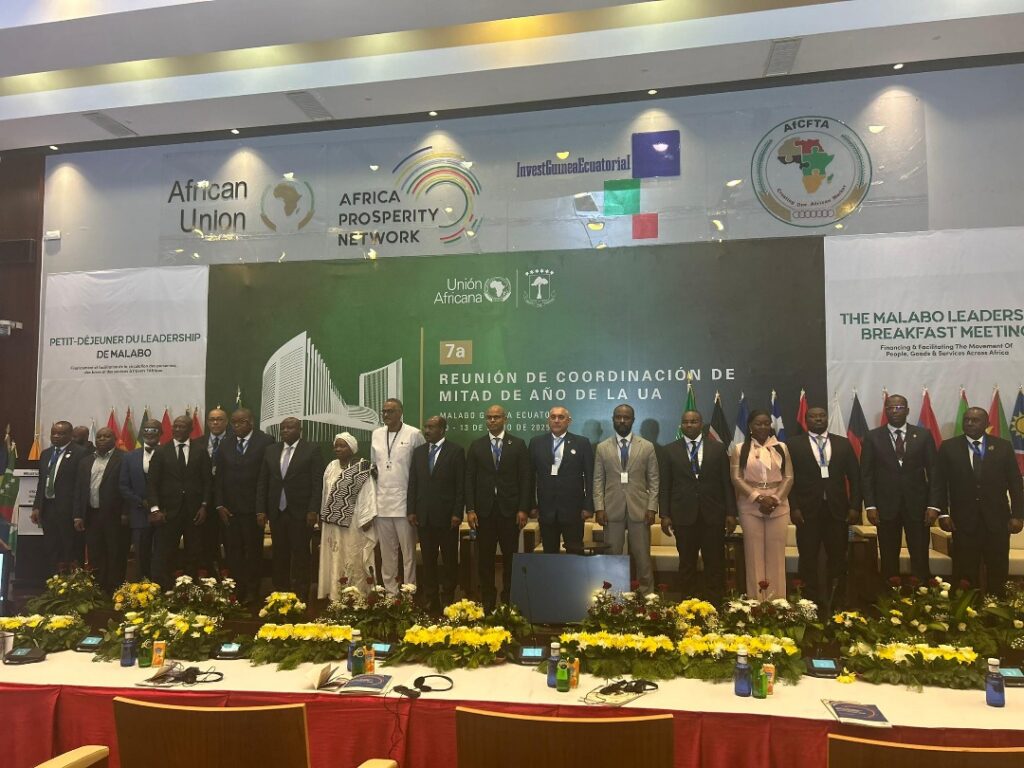
The meeting track reinforced APN’s record of driving tangible policy outcomes, including contributions to the AU’s Digital Trade Protocol and the ongoing Nigeria-Ghana pilot programme for cross-border mobile money interoperability. The network’s advocacy efforts continue to focus on accelerating SAATM adoption, reducing aviation taxes, eliminating visa restrictions, and mobilising investment in infrastructure.
Looking Forward
The APD 2026 launch marks a crucial milestone in Africa’s journey towards genuine economic integration. By prioritising the empowerment of SMEs, women, and youth, the initiative promises to create a more inclusive and sustainable path to continental prosperity.
The next Africa Prosperity Dialogues will convene in February 2026, building on the momentum generated at this historic Malabo breakfast meeting. The focus will remain steadfast on creating practical pathways for the continent’s most dynamic demographic groups to drive and benefit from Africa’s single market.
For More Enquiries, contact
Africa Prosperity Network, Communication Directorate
Tel: +233 20 136 6105
Web: www.africaprosperitynetwork.com
Invest Equatorial Guinea, Communication Department
Tel: +240 222 657 018
Web: www.investguineaecuatorial.com
About the Organisers
Invest Equatorial Guinea serves as the nation’s premier investment promotion agency, facilitating foreign investment and trade whilst ensuring economic diversification and sustainable development. The agency provides comprehensive investor services through AfCFTA Advantage Programmes and Public-Private Partnership Frameworks.
Africa Prosperity Network (APN) is an Accra-based nonprofit organisation dedicated to advancing Africa’s single market and Agenda 2063 through high-impact platforms, including the Africa Prosperity Dialogues. The network connects public and private sectors to accelerate continental integration and sustainable development across Africa.
Distributed to all African and international media houses
